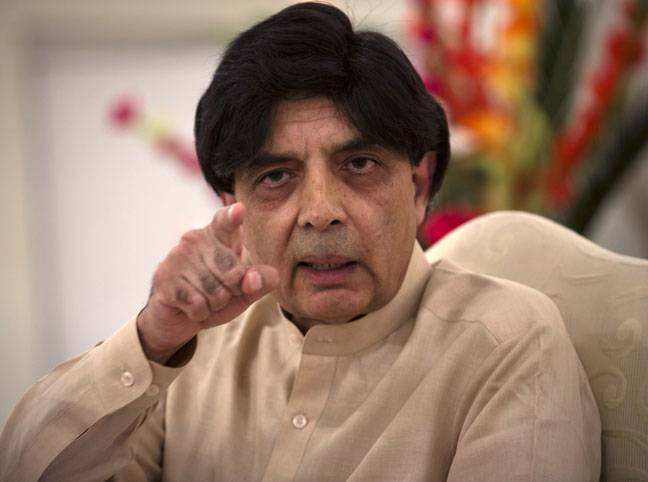ISLAMABAD - The interior ministry has barred 23 international aid groups from operating in Pakistan – suspecting them of posing a threat to the national security.
These groups were disallowed to operate under a new registeration policy for international non-governmental organisations (INGOs) announced in 2015.
The ministry had earlier refused 13 INGOs to work and 10 were disallowed permission during the last week in a meeting chaired by Interior Minister Chaudhry Nisar Ali Khan.
As soon as a final notification is issued, the names of the ‘blacklisted’ welfare groups will be made public, he said.
The spokesperson further said that these NGOs had been "refused permission in view of their past performance or projects, and due to their involvement in certain activities falling outside their domain and stated purpose of their organisation."
However, these INGOs would have the right of review before the interior ministry. These were also being given a grace period of three months to complete their ongoing projects.
Under the 2015 policy announced by the interior ministry to regulate this sector, the meeting also gave permission to three more INGOs to work in Pakistan.
The ministry has so far granted approval to 73 INGOs to operate in the country and undertake various socio-economic projects. Four were allowed last week. The ministry has also deferred cases of 20 INGOs and these would be decided later on.
The meeting convened especially to finalise the process of registration of the INGOs was attended among others by interior secretary, advocate general, National Database and Registration Authority (Nadra) chairman, Federal Investigation Agency (FIA) acting DG and other senior officials.
Chairing the meeting, Nisar said that the registration of INGOs was critical vis-a-vis security of the state.
He said that framing of rules for the INGOs and registering them for the first time in the country was a significant achievement, which would not only bring transparency in the entire system of working of various international aid groups but would also strengthen partnership between the government and the non-governmental sector putting this equation on solid foundations of trust and spirit to complement each other.
The minister appreciated the role of INGOs towards making the registration process a success.
The meeting decided that details of approved and non-approved INGOs along with their past projects would be placed on ministry’s website after finalisation of the process.
The minister last week had directed the ministry to complete the registration work by the end of next month.
The policy announced in October 2015 had given deadline of 60 days to international aid groups to get themselves registered afresh with the ministry. The ministry was given further 60 days to decide the cases. However, extensions were made many times in the deadlines.
System to check human
trafficking
In another significant development regarding FIA's efforts to arrest most wanted human traffickers (MWTs), it was informed during the meeting that FIA with the help of Nadra had developed a system for the processing of information received from a multitude of sources regarding the MWTs and had also put in place a mechanism for real-time information sharing with the relevant stakeholders and its field units.
It was informed that for the first time in the history of the FIA, comprehensive SOPs had been formulated with technological support provided by Nadra to streamline and regulate efforts being made by the agency against the most wanted traffickers.
Besides, FIA is also preparing a database of all most-wanted traffickers that would enable the agency to have complete details of MWTs and take concrete steps for their arrests.
Moreover, FIA has established a dedicated anti-human trafficking cell within the headquarters mandated to maintain and update database and coordinate with all relevant agencies including Nadra, passports directorate, Federal Board of Revenue (FBR), Pakistan Telecommunication Authority (PTA), State Bank of Pakistan (SBP) and others.
FIA has also appointed focal persons in all provinces for dealing with the cases of MWTs of their respective zones.
The meeting was told that FIA's Inter Agency Team had been constituted which would hold regular meetings after every two months to review the progress into the arrests of MWTs along with redressal of the issues.
The minister said that after having completed the process of collecting information about MWTs, all-out efforts should be made to apprehend these criminals.
He said that the assistance from provincial governments, civil armed forces and other law enforcement agencies should also be sought.
He said that red warrants should be issued against those most wanted traffickers who were out of the country.






